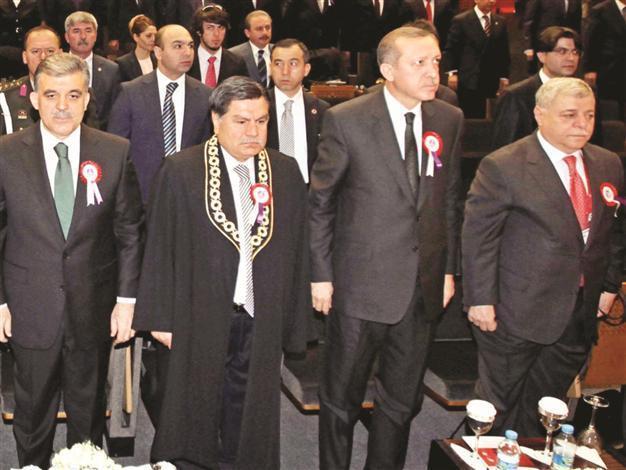New charter should endorse justice: Gül
ANKARA

‘A constitution solely seeking to amend the mistakes of a previous period cannot carry societies forward,’ President Gül (L) who stands next to Constitutional Court President Kılıç (C) and PM Erdoğan at a ceremony marking the 50th anniversary of the court. DAILY NEWS photo, Selahattin SÖNMEZ
With only a week left before the Parliamentary panel begins to pen the new constitution, President Abdullah Gül warned that the charter should not be driven by “reactionary” motives only aiming to “empower the victims of previous periods.”“Let us not forget that a constitutional rule that protects us from our own power when we are powerful today will protect us from the persecution of others when we are weaker tomorrow,” Gül said at a ceremony marking the 50th anniversary of the Constitutional Court. “A constitution solely seeking to amend the mistakes of a previous period cannot carry societies forward,” he added.
Gül stressed that charters could not be designed in accordance with today’s balance of power and needs only, and should be flexible enough to fulfill prospective needs.
“Modern democracies should embody concepts of transparency and accountability, the principle of the separation of powers as well as systems of checks and balances. Among other things, the independence and impartiality of the judiciary, freedom of the press, expression and association are issues that must receive the greatest attention,” Gül said.
Gül admitted that the creation of the constitution was proving to be a very time-consuming process and called for the resolution of “urgent” legal matters, such as the lengthy pre-trial detentions “which have become de facto punishment and could delay the delivery of justice.”
Speaking at the same anniversary ceremony, the President of the European Court of Justice Nicolas Bratza described the lengthy pending trial detentions as “not only a structural but also a systematic problem of Turkey” and called for “direct action” to resolve the problem.
Gül also described how the new constitution should look like and said the charter should have a character based on freedom.
“The new constitution should adopt universal principles and strengthen and safeguard fundamental rights and freedoms for everyone in every way on the basis of equal citizenship. The new constitution should reinforce the achievements of our 200 year-old efforts for constitution-making and democratization and should not make concessions over our unity and integrity and the fundamental principles of our Republic as a democratic, secular, social state respecting the rule of law that we agree on as a nation,” he said.
The state should openly entrust the people, as in contemporary democracies, “rather than covertly trying to ensure tutelage through other bodies,” said Gül.
Gül also hailed the Arab Spring movements, saying that uprisings in the Middle East have shown that the era of ruling people through a means of fear and oppressive methods is about to come to an end.
The continent that should be most pleased with the Arab Spring, and provide the most support to the movement should be Europe, said Gül. “Concepts such as democracy, the rule of law and respect for human rights in the modern sense are primarily values that have originated in Europe and have reflections on a global scale. Therefore, the continent that should be most pleased with and provide support to the Arab Spring, which commenced with the demand of the people for democratic transformation, should be Europe.”
In a veiled reference to the Constitutional amendments of the Sept. 12, 2010 referendum, Gül said the high court had recovered “from the dominance of implicit tutelage.”
“The roles of supreme courts that perform constitutional supervision on behalf of the people are as important as the constitution in ensuring that democracy and justice are fully exercised and delivered. Our Constitutional Court, with a history of half a century today, has recovered from the dominance of implicit tutelage,” Gül said.
The Constitutional Court’s structure was dramatically changed by the 2010 referendum. Its number of members increased from 11 to 17, while Parliament received the right to appoint 3 of the new members.
Gül expressed his gratitude to members of the political parties as well as religious communities for their participation in the symposium.
Representatives of Greek and Armenian communities in Turkey also attended the symposium, the Hürriyet Daily News has learned.
















